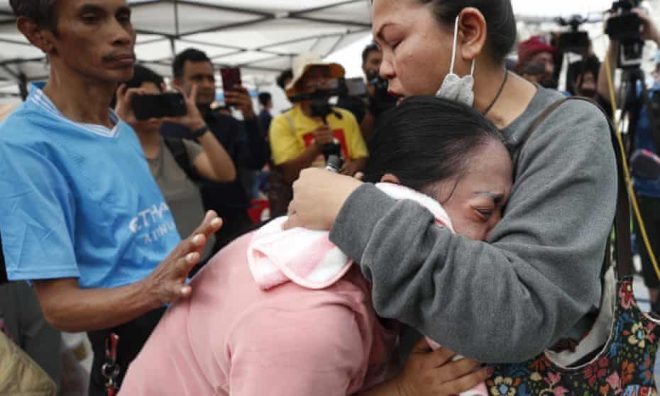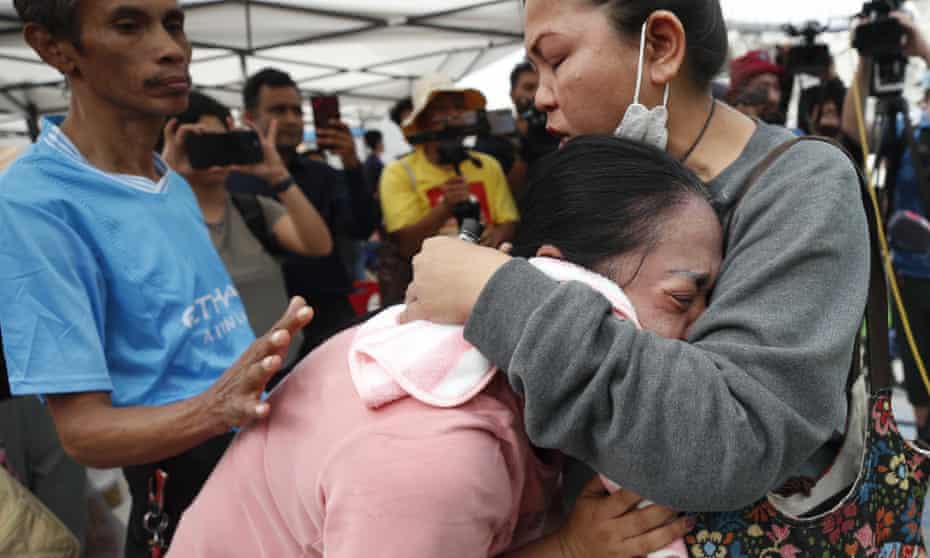
India Sends NDRF Team to Aid Earthquake Rescue Operations in Myanmar
In a significant response to the recent devastating earthquake in Myanmar, the Government of India has dispatched an 80-member team from the National Disaster Response Force (NDRF) to assist in rescue operations. This humanitarian effort underlines India’s commitment to regional stability and disaster relief, reinforcing its position as a supportive neighbor in times of crisis.
The Earthquake in Myanmar
The earthquake, which struck Myanmar on March 29, 2025, has caused severe damage and posed significant challenges for local authorities. The tremors have resulted in loss of life, widespread destruction of infrastructure, and a humanitarian crisis that requires immediate attention. In light of these circumstances, international assistance is crucial to aid recovery efforts and support affected communities.
India’s Humanitarian Response
Prime Minister Narendra Modi has personally engaged in addressing the crisis by communicating with Myanmar’s military leadership. In his conversation with Myanmar’s General, Modi extended offers of aid and assistance to help mitigate the devastating effects of the earthquake. This proactive approach demonstrates India’s dedication to providing timely support to its neighbors during emergencies.
The Indian government has mobilized resources quickly, sending the first consignment of aid, which includes essential items such as tents, food, and medical supplies. These supplies are vital for the immediate relief efforts, as they address the urgent needs of those displaced by the earthquake. The NDRF team, known for its expertise in disaster management, will play a crucial role in search and rescue operations, helping to locate survivors and provide medical assistance to those in need.
- YOU MAY ALSO LIKE TO WATCH THIS TRENDING STORY ON YOUTUBE. Waverly Hills Hospital's Horror Story: The Most Haunted Room 502
Importance of Regional Solidarity
India’s decision to send an NDRF team to Myanmar is a reflection of the importance of regional solidarity in times of crisis. Natural disasters do not respect borders, and the impact can be felt across neighboring countries. By providing assistance, India not only helps alleviate the suffering of the Myanmar people but also strengthens diplomatic ties and fosters goodwill in the region.
The Role of the NDRF
The National Disaster Response Force (NDRF) is India’s specialized agency responsible for disaster management. Established to respond to natural and man-made disasters, the NDRF is trained to operate in challenging conditions, providing rapid response to emergencies. The team dispatched to Myanmar consists of skilled personnel equipped with the necessary tools and equipment to carry out effective rescue operations. This includes trained search and rescue experts, medical staff, and support personnel who can work in tandem with local authorities to enhance the overall response efforts.
Global Support and Collaboration
The earthquake in Myanmar has attracted global attention, with various countries and organizations offering their support. International collaboration in disaster response is crucial as it brings together diverse expertise and resources, enhancing the effectiveness of relief efforts. India’s initiative to lead the charge in providing assistance exemplifies a growing trend of nations working together to tackle the challenges posed by natural disasters.
Conclusion
As the situation in Myanmar continues to evolve, the efforts of the Indian government and the NDRF team will be critical in providing the necessary support to affected communities. The immediate focus remains on search and rescue operations, along with delivering essential aid to those in need. India’s prompt response not only underscores its commitment to humanitarian values but also highlights the importance of regional cooperation in addressing crises effectively.
In the face of adversity, the spirit of solidarity and compassion shines through. The assistance being rendered by India is a testament to the enduring bonds of friendship and support that exist between nations, paving the way for recovery and rebuilding in Myanmar. As the world watches, the collaborative efforts of various countries will play a vital role in ensuring that the people of Myanmar receive the help they desperately require during this challenging time.
This unfolding situation serves as a reminder of the unpredictable nature of natural disasters and the essential need for preparedness and swift action. Moving forward, the focus will be on rebuilding lives and infrastructure in Myanmar while continuing to foster a culture of cooperation among nations in the face of global challenges.

BIG BREAKING NEWS India sends 80-member NDRF team to aid rescue op after massive earthquake in Myanmar.
World leader Narendra Modi spoke to Myanmar General, offers aid amid crisis.
First aid consignment, including tents, food, and medical supplies.
Earthquake caused… pic.twitter.com/1DNBBA3Fdv
— Times Algebra (@TimesAlgebraIND) March 29, 2025
BIG BREAKING NEWS India sends 80-member NDRF team to aid rescue op after massive earthquake in Myanmar
In a remarkable show of solidarity and swift response, India has mobilized an 80-member team from the National Disaster Response Force (NDRF) to assist in rescue operations following a devastating earthquake that struck Myanmar. This significant development was announced via social media, highlighting India’s commitment to supporting its neighbors in times of crisis. The response comes as the region grapples with the aftermath of the quake, which has caused considerable destruction and loss of life.
World leader Narendra Modi spoke to Myanmar General, offers aid amid crisis
Prime Minister Narendra Modi has directly reached out to Myanmar’s military leadership to extend his condolences and offer assistance. The conversation between Modi and the Myanmar General underscores India’s proactive approach to diplomatic relations and humanitarian aid. The Prime Minister expressed his sorrow over the disaster and emphasized India’s readiness to help in any way possible. This not only showcases India’s leadership in regional matters but also strengthens ties between the two nations during a critical time.
First aid consignment, including tents, food, and medical supplies
The first aid consignment dispatched by India includes essential supplies that are crucial for immediate relief efforts. This shipment contains tents, food, and medical supplies designed to address the urgent needs of those affected by the earthquake. With the destruction of homes and infrastructure, providing basic necessities is a top priority. The NDRF team, equipped with specialized skills and resources, is expected to play a pivotal role in the ongoing rescue and recovery operations. As reported by NDTV, the Indian government is committed to ensuring that aid reaches those who need it most.
Earthquake caused
The earthquake that prompted this massive response measured a significant magnitude, leading to widespread panic and chaos in Myanmar. The tremors were felt across various regions, and preliminary reports indicate extensive damage to infrastructure and homes. The humanitarian crisis is growing, with many individuals displaced and in dire need of assistance. As the situation continues to unfold, the focus remains on providing immediate support to the affected communities.
International Response and Solidarity
India’s swift action is part of a broader international response to the earthquake. Various nations and humanitarian organizations are rallying to provide assistance, showcasing a spirit of global solidarity. Countries around the world are closely monitoring the situation and are prepared to offer support where needed. The collaborative efforts underscore the importance of international cooperation in times of crisis, as nations come together to aid those impacted by natural disasters.
The Role of NDRF in Disaster Management
The National Disaster Response Force (NDRF) plays a critical role in India’s disaster management strategy. With a trained and specialized workforce, the NDRF is equipped to handle various emergencies, including earthquakes, floods, and other natural calamities. Their expertise in rescue operations, medical assistance, and disaster recovery is invaluable during crises like the one currently unfolding in Myanmar. As highlighted in a report by The Hindu, the NDRF’s commitment to timely intervention can save lives and alleviate suffering.
Challenges Ahead for Myanmar
While the immediate focus is on rescue and relief efforts, Myanmar faces significant challenges in the aftermath of the earthquake. The destruction of infrastructure complicates logistics, making it difficult to deliver aid to remote areas. Additionally, the ongoing political situation in Myanmar may hinder coordinated efforts to provide assistance. As the international community steps in to help, it’s essential to navigate these challenges carefully to ensure that aid reaches those in need as quickly as possible.
Community Resilience and Recovery
In the face of adversity, the resilience of the communities affected by the earthquake will play a crucial role in the recovery process. Local organizations and volunteers are stepping up to provide support and assistance, demonstrating the strength of community ties. Recovery efforts will require a collaborative approach, involving both local and international stakeholders. As reported by BBC News, rebuilding efforts will take time, but with collective determination, communities can overcome the challenges posed by this disaster.
The Importance of Preparedness
This recent earthquake serves as a reminder of the importance of disaster preparedness, not just for Myanmar, but for all earthquake-prone regions. Governments, NGOs, and communities must prioritize developing and implementing effective disaster response plans. Education and training can empower individuals to respond effectively during crises, reducing panic and enhancing survival rates. As we reflect on this recent event, it becomes clear that readiness can significantly impact the outcome of disaster scenarios.
Looking Forward: A Call for Global Solidarity
The earthquake in Myanmar and the subsequent international response highlight the need for global solidarity in addressing humanitarian crises. As nations come together to provide aid, it’s crucial to foster an environment of cooperation and mutual support. Whether through financial assistance, supplies, or expertise, every contribution counts in the fight against the devastating effects of natural disasters. As stated by Prime Minister Modi, “We stand with Myanmar in this time of need.”
Staying Informed and Involved
For those looking to help, staying informed about the situation in Myanmar is essential. Numerous organizations are collecting donations and mobilizing resources to support relief efforts. Engaging with these organizations can make a meaningful difference in the lives of those affected by the earthquake. Social media platforms and news outlets are also valuable sources of information, keeping the public updated on ongoing efforts and how to contribute.
This moment serves as a powerful reminder of the interconnectedness of our world. In times of crisis, our ability to come together and support one another defines humanity. As we watch events unfold in Myanmar, let’s not forget the importance of compassion and solidarity in rebuilding lives and communities.
